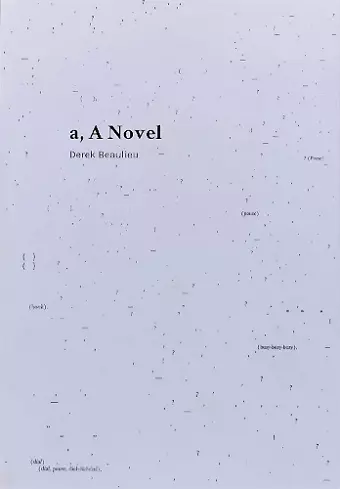a, A Novel
Format:Paperback
Publisher:Jean Boite editions
Published:13th Jun '17
Should be back in stock very soon

Derek Beaulieu’s a, A Novel is an erasure-based translative response to Andy Warhol’s eponymous novel. Beaulieu carefully erases all of the text on each page of the original work, leaving only the punctuation marks, typists’ insertions and onomatopoeic words. The resultant text is a novelistic ballet mécanique, a visual orchestration of the traffic signals and street noise of 1960’s New York City. This visually powerful half score/half novel highlights the musicality of non-narrative sounds embedded within conversation. Published in the autumn of 1968, Andy Warhol’s a, A Novel consists solely of the transcribed conversations of Factory denizen Ondine (Robert Olivo). Ondine’s amphetamine-addled conversations were captured on audiotape as he haunted the Factory, hailed cabs to late-night parties and traded gossip with Warhol and his coterie. The tapes were transcribed by a small group of high school students. Rife with typographic errors, censored sections, and a chorus of voices, the 451 pages of transcription became, unedited, “a new kind of pop artefact”. These pages emphasize transcription over narration, chance over composition. In his book, Derek Beaulieu offers a radical displacement of Andy Warhol’s work. He erases the novel’s speaking characters — members of the mid-1960s New York avant-garde — and preserves only the musicality of their conversations. Beaulieu perfectly provides a tangible example of Theodor Adorno’s theory elaborated in his essay “Punctuation Marks” (1956), in which he argues that punctuation marks are the “traffic signals” of literature and that there is “no element in which language resembles music more than in the punctuation marks”. This visual poetry is accompanied by an essay by Gilda Williams, “Breaking Up is Hard to Do. Men, Women, and Punctuation in Warhol’s Novel a”. Her deep knowledge of both Andy Warhol’s work and the history of contemporary art explores the complicated history of the original novel and highlights the urgent and precise spirit of Derek Beaulieu’s work—the work of an artist who situates Uncreative Writing at the core of contemporary literature and also shows in his book a feminist gesture.
ISBN: 9782365680196
Dimensions: unknown
Weight: 815g
480 pages